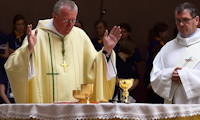Looking back on last month, the main highlight for most people surely was the King and Queen’s Coronation. Even if you are a staunch republican, you couldn’t have missed it!
Certainly “Coronation” and “Monarchy” and the rituals surrounding the ceremony have formed a part of many people’s conversations over these last months and certainly the media would not let us forget it. It's all very splendid, magnificent and triumphal.
Yet, the origins of kingship and monarchy in the Judeo-Christian traditions have rather a less sparkling ancestry. For the Hebrew people, the King was God. God protected the people and gave them laws to guide them and make them secure in the land. In the First Book of Samuel, we hear how the people demanded to have a king just like the other nations surrounding them. In so doing they showed their lack of trust in God and his prophet and the rejection of God’s rule over them. Even so, God chose a king from among the people and gave them his spirit so that he would lead them rightly.
So, the monarch ruled with the blessing of God and filled with God’s spirit. Again, in the Book of Samuel, we are told that God chose Saul and Samuel anointed him. The anointing is the sign of being set apart for a God-given task, and the assurance that all the gifts necessary to complete that task are also given in abundance. And that is still the meaning of anointing in the ritual of coronation today. Similarly, those who are baptised, confirmed and consecrated in Holy Orders are anointed, set apart for special tasks and given the gifts necessary to fulfil these tasks.
One of the titles the Monarch has in these islands is “Defender of the Faith”. The origins of this title go back to the time of Henry VIII, on whom it was bestowed by Pope Leo X in 1521 in recognition of his theological defence of the seven sacraments and the authority of the Pope. King Charles has on several occasions described himself as the Defender of Faiths. So, it will be interesting to see how this aspiration works out in the reality of everyday life. This is what King Charles said soon after his accession, speaking to a gathering of religious leaders at Buckingham Palace:
As a member of the Church of England, my Christian beliefs have love at their very heart. By my most profound convictions, therefore – as well as by my position as Sovereign – I hold myself bound to respect those who follow other spiritual paths, as well as those who seek to live their lives in accordance with secular ideals.
So, we pray for King Charles, therefore, that he may constantly secure and preserve for the people entrusted to his care their freedoms, especially for their religious freedom.
In blessed hope,
Terry +

